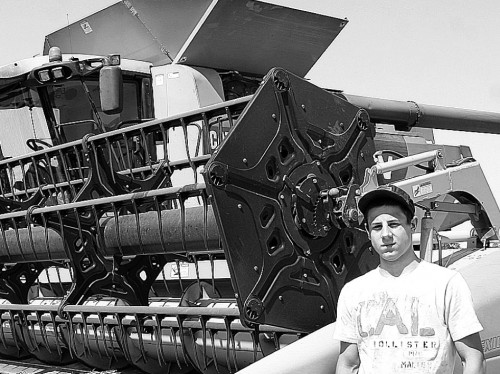County News
Next generation


Dallas Hunter pauses a moment while harvesting wheat north of Wellington.
The changing face of farming
Winter wheat is coming off the fields a good two weeks early this summer. A hot dry summer along with a warm patch in March is keeping yields low (measured in volume of grain per acre) but quality is very good according to Dallas Hunter. He expects it to be an okay year for the wheat—but he’s worried about the corn. Without any meaningful amount of rain in the past few weeks, the plants are under stress with the leaves twisting upward rather than flopping over as they should at this time of year. Worse the plants are producing kernels now; without a large prolonged rain soon, Dallas expects dramatically lower yields. Corn prices have spiked to all-time highs in recent weeks in anticipation of a tough harvest across North America this fall.
It is a lot to absorb for a 17 year old—especially one who has just made a big investment in farming. Dallas is a seventh generation farmer in the Hunter family. His dad David and grandfather Bob Hunter own and farm about 5,000 acres north of Wellington and west to Lake Ontario.
Dallas has just bought a 40-foot combine harvester—a massive bit of engineering and technology that can, if desired, guide its own way down the field cutting, threshing and spitting out straw. His grandfather believes it might be among the largest harvesters in the County.
Unlike farm implements of even a decade ago, the controls of this modern behemoth appear to be inspired by a video game. A computer screen provides the operator with a wide and variable array of data about the machine, the product being processed and even the conditions in which it is harvesting. A joy stick at Dallas’s right hand guides many of the hightech functions of this machine.
Bob Hunter admits that advancing technology in farming demands a younger and more highly skilled workforce. It is one reason why he is encouraged by his grandson’s decision to stake at least part of his future in the business.
Dallas is a student at PECI. But before the winter winds blow he expects to have harvested more than 2,000 acres on his harvester. That means long, long days. For the past few weeks he has risen by 6 a.m. He spends about two hours maintaining and preparing the harvester— working through a checklist of items to ensure the machine is running optimally. Then he fuels up; when empty, the harvester will need about $1,000 worth of fuel to fill it.
Then, when the dew is off the crop about 9 a.m., he heads to the field. He won’t stop until about 10 o’clock that night. He’ll do this every day the weather allows.
It is a nerve-testing business. He can do everything right—run the machine at its optimum, look after it well—yet is still reliant upon the weather or commodity prices, or other variables he can’t control, to determine if he has a good year or a bad one.
Dallas says he doesn’t let it get to him. He keeps his head focused on the task in front of him. He doesn’t worry about things out of his control.
Dallas is focused on harvesting 2,000 acres on the family’s farm plus whatever custom work he can pick up along the way.
Staying cool is a harder thing for his grandfather to do. Bob Hunter has backstopped the loan for the harvester. He keeps his eyes trained on weather patterns and the trending price of corn, wheat, soy beans and canola. He’s farmed long enough to know that even when things go well, problems can arise. At the moment he is worried that with everyone harvesting wheat all at once, he might not get access to the terminal to sell the grain.
Yet, despite the hardships and disappointments, Bob Hunter is excited to see his grandson investing in the family business. The land has attracted another generation.

Comments (0)